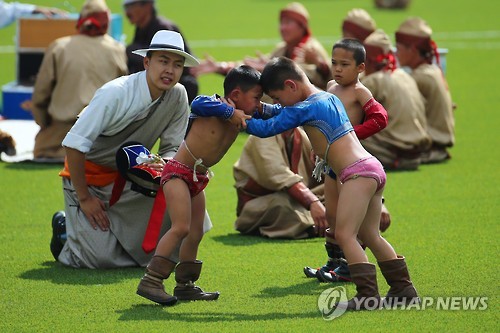800년 전통 ‘몽골 나담 축제’, 코로나 여파로 전면 취소

*아시아엔 해외통신원 기고문의 한글번역본과 원문을 함께 게재합니다.
[아시아엔=안토니오 그라세포, 덴다르 잠스란 기자] 몽골 국가 비상대책위원회가 지난 7월 2일 ‘나담’(Nadaam) 축제를 전면 취소하기로 결정하면서 800년 넘는 전통을 자랑하던 몽골 최대의 여름 축제가 침체기에 빠지고 말았다. 이에 7천년 이상 명맥을 이어온 전통 씨름 등 몽골 전통 경기들이 위기를 맞게 됐다.
‘나담’은 매년 7월 11일~7월 13일까지 몽골 전역에 걸쳐 즐기는 전국적인 축제다. 나담은 중앙아시아의 광대한 초원에서 오랫동안 유목 생활을 해온 몽골의 유목 문화를 반영한다. 이 축제는 단순히 몽골 관광산업에 활력을 불어넣을 뿐만 아니라, 삶 속 깊숙이 자리하고 있다.
나담 축제는 1206년에 징기스칸이 왕위에 즉위한 것을 기념하기 위해 시작된 이래로 거의 매년 개최돼 왔으며, 1922년부터 공식적인 국가 행사로 자리잡았다. 이 시기 전국 각지의 몽골 국민들은 수도 울란바토르(Ulaanbaatar)에 모여 축제를 즐기고, 남성들은 씨름, 말타기, 활쏘기 등 ‘3종 경기’에 참여해 갈고 닦은 실력을 자랑한다. 그 중에서도 가장 인기 있는 종목은 몽골 전통 씨름인 ‘부흐’(B?kh)다.
지난 2020년엔 몽골 정부의 봉쇄 정책에 따라 나담 축제는 비대면으로 진행된 바 있다. 남성 3종 경기와 기념행사가 수도 울란바토르에서 무관중으로 진행되는 바람에, 사람들은 TV로 축제를 즐겨야만 했었다.
그나마 작년에는 수도 밖에서라도 전통 의상을 입고 용맹한 참가자들을 응원하면서 축제를 즐길 수 있었지만, 올해는 이 마저도 어렵게 됐다. 코로나19가 확산됨에 따라 몽골 정부가 나담축제를 전면 취소하기로 결정했기 때문이다. 올해는 대다수 지역에 봉쇄조치가 내려지면서 선수들이 훈련을 제대로 받지 못했으며, 몽골 정부도 지역사회에서 열리는 모든 행사를 중단하도록 조치하면서 모든 것이 멈춰버렸다.
몽골 국민의 절반 가까이가 울란바토르에 거주하고 있지만, 그들이 태어나고 자란 고향은 수도 외곽 지역이다. 코로나 이전까지만 해도 주말이나 공휴일이면 고향으로 돌아가서 휴식을 취하고 돌아올 수 있었지만, 올해는 국내 여행을 제한하는 조치마저 내려지면서 사람들이 고향으로 내려가기 어려운 것이 현 상황이다.
2021년은 몽골 대제국 수립 815주년, 몽골 독립 선언 110주년, 몽골 인민 혁명 100주년 등 국가의 기념비적인 해이기도 하다. 나담 축제가 열릴 수 있었다면 더욱 뜻 깊은 축제가 됐을 것이기에 아쉬움이 더 크다. 번역 김동연 인턴기자
Coronavirus cancellation of Mongolia’s Naadam deals harsh blow
By Antonio Graceffo & Dandar Jamsran in Ulaanbaatar
Mongolians have been wrestling for around 7,000 years or more. However, the sport will endure another harsh blow this year, with the annual Naadam festival cancelled for a second time in a row due to the Covid crisis.
Mongolia’s most important annual festival, Naadam, has been held every year for the past 800 years, but it has been laid low by the coronavirus pandemic for the second year in a row. Naadam was cancelled on July 2.
The news will come as a bitter blow for Mongolians, not just because the event is a major tourist attraction that earns the country millions of dollars a year, but mainly because it has become deeply ingrained in the country’s culture.
The first Naadam was commissioned in 1206 by Genghis Khan. The festival has been held almost every year ever since. Mongolians from across the country travel to the capital of Ulaanbaatar to celebrate, meet relatives and compete in the “Three Manly Games.”
The mid-July festival, which in 1922, became an official holiday, has three main components: Mongolian B?kh wrestling, archery and horse racing, of which B?kh wrestling is by far the most revered.
In 2020, Naadam was threatened by COVID lockdowns, with the government finally deciding to go with a virtual Naadam.
The national games and ceremonies were still held in the capital, but the audience was resigned to watching the events on TV, rather than attending live.
This year, Prime Minister Luvsannamsrain Oyun-Erdene has taken the painful decision to cut the festival completely because of the dire virological situation in the country.
Naadam 2021 would have been of particular importance, because it marks the 815th anniversary of the founding of the Great Mongol Empire, the 110th anniversary of Mongolia’s Independence from the Qing Dynasty, and the 100th anniversary of the Mongolian People’s Revolution.
In 2020, outside of the capital, in the aimags (provinces) and soums (counties), Naadam was held more or less as it always has been, with nearly the entire population turning out, largely in traditional dress, to support their cultural heritage and cheer for their heroes.
This year, however, numerous provinces are under lockdown, making it impossible for wrestlers in some parts of the country to train, and the government has ordered all of the local games to be halted as well.
While roughly half of the country’s population lives in the capital of Ulaanbaatar, most have their roots elsewhere and many would return to the province or soum where they grew up, to spend the holiday.
This year, however, internal travel restrictions have complicated the movement of people from the capital to the countryside, and vice versa. Some people are also avoiding travel for fear of getting stuck due to a lockdown being imposed during their trip.





